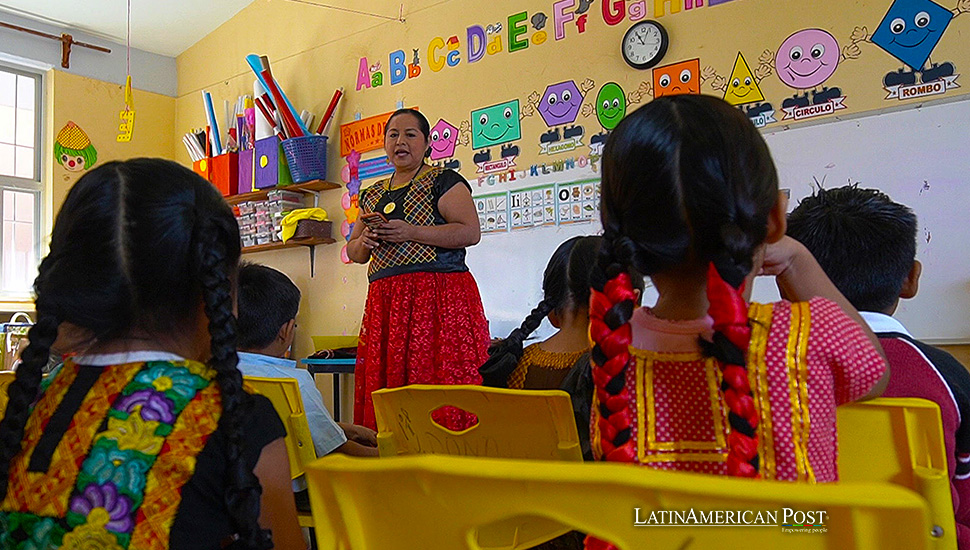Preserving the Voice of the Ancients: The Zapotec Language’s Woman Guardian in Mexico

In Oaxaca, Mexico, Micaela Hernández, ‘Kelly Tehuanita,’ emerges as a crucial defender of the endangered Zapotec language, teaching and revitalizing it amidst the dominance of Spanish, aiming to preserve a vital part of Mexico’s indigenous heritage for future generations.
Preserving Zapotec: Kelly Tehuanita’s Crusade
In the vibrant heart of Oaxaca, southern Mexico, Micaela Hernández, affectionately known as ‘Kelly Tehuanita,’ stands as a beacon of hope for preserving the Zapotec language. On International Mother Language Day, she sounds the alarm that Zapotec, one of Mexico’s 68 indigenous languages, is teetering on the brink of extinction.
Hernández’s commitment to cultural promotion in San Blas Atempa, a municipality within the Isthmus of Tehuantepec, highlights a concerning trend: the gradual decline of Zapotec due to the dominance of Spanish and other foreign languages in both educational settings and households across the region. Her crusade is especially poignant in Santo Domingo Tehuantepec, where the ancestral tongue has vanished over two generations, with less than 5% of the population of over 68,000 people still fluent in speaking, understanding, and writing in Zapotec.
“My dream is for our mother tongue to endure, to be spread and revived; it’s our identity,” Hernández tells EFE with conviction. For 15 years, Kelly Tehuanita has been imparting Zapotec language lessons to preschool educators in Tehuantepec, including at the Donaji kindergarten — named after a pre-Hispanic Zapotec princess — which serves 68 children.
“In Tehuantepec, Zapotec has already been lost, but it’s heartening that various educational institutions are concerned about offering Zapotec classes because it’s crucial to revive our language here in Santo Domingo Tehuantepec. For me, this is of utmost importance,” she explains.
Indigenous Advocates Taking Charge
Faced with the inadequacies of official language education, indigenous advocates like Hernández are taking matters into their own hands. Meanwhile, Adelfo Regino Montes, the Director General of the National Institute of Indigenous Peoples (INPI), defends the government’s constitutional reform to protect the 68 indigenous languages and 364 variants spoken by approximately 7.3 million people.
“The cornerstone of this constitutional reform is to acknowledge Mexico as a pluricultural and multiethnic nation, home to 70 indigenous peoples and the Afro-Mexican community across the national territory,” Montes stated at a government press conference.
As official strategies slowly materialize, Kelly Tehuanita teaches her students traditional songs in Zapotec, like ‘Dxuladi,’ which translates to chocolate. Her curriculum includes greetings in Zapotec, numbers, and phrases for everyday interactions. The school has even implemented a policy requiring students to wear traditional regional attire at least once a week, fostering a deep connection with their heritage.
Hernández extends her mission to the airwaves through the community radio station La Tehuanita 105.7 FM, where she serves as the general coordinator. Here, she introduces her listeners to the Zapotec pronouns, verbs, and adjectives in an engaging manner, earning her the nickname ‘La Tehuanita’.
“Our language must be our flag wherever we go, not just in our hometown. We must speak it proudly because we’re proud to be Zapotec. Many people are embarrassed to speak Zapotec because they fear their tongue will twist or they’ll face rejection,” she emphasizes.
Oaxaca’s Rich Diversity: A Global Perspective
Oaxaca is one of Mexico’s states with the highest population of indigenous language speakers, with over 420,000 Zapotec speakers, as documented by the National Institute of Statistics and Geography (INEGI). The United Nations Educational, Scientific and Cultural Organization (UNESCO) established International Mother Language Day on February 21 to promote the preservation of native languages, with Mexico ranking among the top 10 countries for indigenous language diversity.
Also read: Tracking the Shadow: Mexico’s Third National Jaguar Census Aims to Protect Its Stealthy Inhabitants
Micaela Hernández’s unwavering dedication to preserving the Zapotec language illuminates Latin America’s broader struggle for linguistic and cultural survival. From the Quechua speakers in the Andean regions to the Guarani communities in Paraguay, indigenous languages face threats from globalization, migration, and cultural assimilation. Yet, through the efforts of individuals like Hernández and supportive educational reforms, there is hope that these ancient tongues, rich in history and knowledge, will continue to flourish for generations to come.




